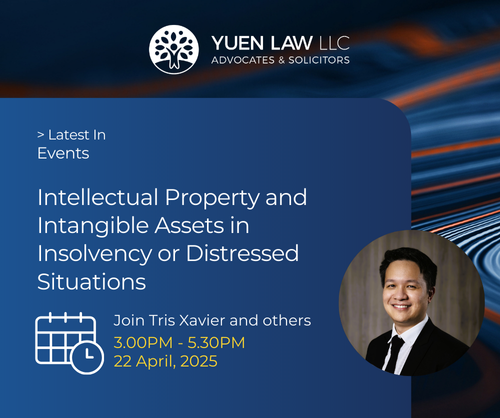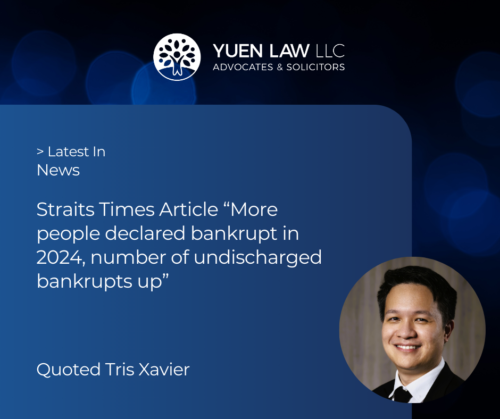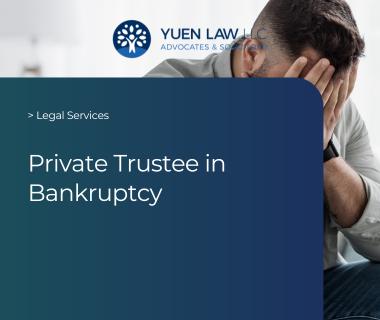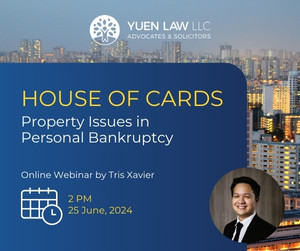This article looks at some recent developments in the bankruptcy and insolvency laws in Singapore.
In the decision of Re Eng Lee Ling and another matter [2024] SGHC 52, the Singapore High Court clarified the operation of section 328 of the IRDA 2018 (the “Act”) on two important fronts: 1) whether an application under the section can be brought before the relevant bankruptcy order has been made, and 2) the proof which an applicant ought to bring before the Court when the application is prospective.
Background of the Case
The matter related to a husband and wife who were joint owners of a property. A first bankruptcy application was taken out against the wife by a creditor (“C1”). To settle the debts with C1, the wife proposed the sale of the property, and the repayment of the full sum due and owing to C1, in return for C1 withdrawing the bankruptcy application. However, C1 refused.
Following the adjournment of the wife’s bankruptcy application to grant the Official Assignee time to determine her eligibility into the Debt Repayment Scheme (as provided for under section 316 (9) of the IRDA read with section 289), the couple entered into an agreement to sell the property to a third-party purchaser. However, a few days before the scheduled completion date, the purchaser refused to complete due to the looming bankruptcy application against the wife, on the grounds that good title could not be given.
Subsequently, a separate bankruptcy application was brought against the husband by a separate creditor (“C2”). C2 also brought a bankruptcy application against the wife not long after.
In light of the above, and to complete the transaction, the couple brought the applications before the Court to seek ratification of the disposition of the property. The solicitors who attended the hearing were counsel for the applicants, and separately, counsel for C2.
The Court’s Decision
Was the application for the disposal of property prior to the bankruptcy order premature?
The Court first considered whether the application under section 328 was premature as the Bankruptcy Orders had not yet been made against either debtor, as there had been no reported decisions making a clear judicial pronouncement on the same.
To this, the Court held that the section permitted a prospective disposition of property before a bankruptcy order was made. The Court agreed with counsel for the applicants that the term “consent” ordinarily meant authorization before something was done. This was to be distinguished from the word “ratification”, which ordinarily meant authorization after the fact, and was especially clear given the use of the adverb “subsequently”.
The Court also held that there was nothing in the purpose or context of the section that militated against the granting of prospective orders before dispositions were made. The Court noted the previous decision of Centaurea International Pte Ltd (in liquidation) v Citus Trading Pte Ltd [2017] 3 SLR 513, where the learned Judge had held in the context of the then-section 259 of the Companies Act that the possibility of seeking consent before a disposition was made; and went on to hold that if the Court could only ratify transactions after the bankruptcy order was made, parties dealing with the debtor ran the risk that the transaction would be set aside after the bankruptcy order was made, which was a “wholly uncommercial result”.
When consent ought to be granted for prospective dispositions
The Court reiterated the principles set out by the Court in Sutherland, Hugh David Brodie v Official Assignee and another [2021] 4 SLR 752, that the disposition ought to be fair and to the benefit of the general body of unsecured creditors. However, the Court noted that unlike an application for ratification, an application for prospective consent involved an element of fortune telling, and that the Court had to project if the transaction would benefit the general body of unsecured creditors. To this, the Court observed that the applicant would have to persuade the Court on the balance of probabilities that such disposition was likely to benefit the creditors generally.
In the present case, the Court dismissed the applications. The Court noted that the applicants had failed on a number of grounds, including:
- A failure to produce a list of creditors. The Court noted that the applicant would have to show the effect of the proposed distribution on the creditors, and at the very least produce a list showing the planned distribution to the creditors known to the applicant. On this front, the applicant did not reveal any other creditor save for C1.
- The Court held that the repayment of C1 to stave off the bankruptcy application, and thereafter hoping that the business would keep going, was insufficient to satisfy the Court that the disposition would benefit the general pool of creditors.
- While the Court noted that a disposition to one creditor preferentially did not automatically render the application void, the applicants would have to convince the Court that the preference would still be of benefit to the pool of unsecured creditors. On this front, the applicants did not persuade the Court that the payment of C1 preferentially rather than all creditors pari passu was beneficial.
- The failure to produce a valuation report, and the failure to show marketing by the applicants, meant that the Court could not be sure that the sale price was a benefit to the creditors, and thus could not validate the sale even if it meant that the sale would be lost.
Conclusion
The decision helpfully clarifies that seeking the Court’s consent for dispositions of property under section 328 of the IRDA may be done prior to the bankruptcy order. It also sets out with helpful clarity the standard which applicants need to be prepared to show the Court when making such prospective applications for consent.
Our associate director, Tris Xavier acted for the applicants before the High Court.
If you would like information and/or assistance on insolvency matters, you may contact:
Tris Xavier
Associate Director – Insolvency and Restructuring
T: +65 6536 6037
E: tris@yuenlaw.com.sg
Click here to view Tris’s CV.





